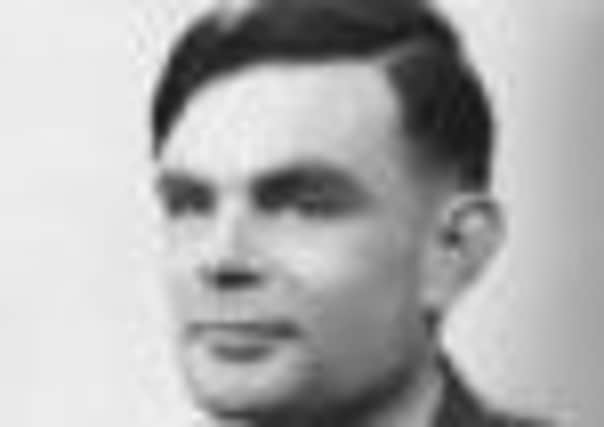Spymaster tackles code for father of the Information Age


LAST night the director of GCHQ, Iain Lobban, gave a rare speech at Leeds University.
It’s not every day that one of Britain’s top spy chiefs drops in and his visit was, not surprisingly, kept under wraps for security reasons. Lobban, an alumnus of the university, was in Leeds to deliver a speech in tribute to the acclaimed codebreaker and mathematician Alan Turing entitled GCHQ and Turing’s Legacy.
Advertisement
Hide AdAdvertisement
Hide AdTuring is widely considered to be the father of computer science and artificial intelligence, but most people probably recognise his name from the Second World War when he worked for the Government Code and Cypher School (GC&CS) at Bletchley Park designing techniques for breaking German ciphers, including those encrypted using the Enigma machine.
Despite such monumental achievements Turing’s life ended in ignominy. Unashamedly gay, in 1952 he was arrested and convicted of gross indecency, when homosexual acts were illegal in the UK. To avoid prison, he was given experimental chemical castration as a “treatment” and his security privileges were removed, meaning he could not continue work for the UK Government Communications Headquarters (GCHQ), and two years later he took his own life at the age of just 41.
It was a tragic end for a hugely gifted man who had served his country with distinction and helped push back the scientific boundaries.
Last night’s speech was part of a programme of events to mark the centenary of Turing’s birth and in it Lobban praised his contribution to the wartime code-breaking effort at Bletchley Park, including the cracking of Enigma. He also paid homage to Turing’s “genius”, saying: “Turing was a founder of the Information Age: one of the people whose concepts are at the heart of a technological revolution which is as far reaching as the Industrial Revolution.
Advertisement
Hide AdAdvertisement
Hide Ad“Throughout the post-war era, we continued to enjoy the benefits of the abstract Turing machine model, from our 1980s washing machines to the mini computers we carry in our pockets today. Turing was part of a revolution which has led to a transformation of every aspect of our lives.”
There has been growing recognition of the significance of his long list of achievements in recent years and recognition, too, of the way he was mistreated. In 2009, while he was still Prime Minster, Gordon Brown saw fit to issue an official apology for Turing’s shameful treatment, and in July this year campaigners fighting to get a pardon for the computer pioneer took their battle to the House of Lords.
Professor Barry Cooper, of Leeds University’s School of Mathematics, is also chairman of the International Turing Centenary Committee. He says events celebrating Turing’s life have been held all over the world.
“This centenary is doing a great deal for Turing in that people are learning about him and slowly we’re bringing his name into people’s consciousness, although he’s still not a household name,” he says.
Advertisement
Hide AdAdvertisement
Hide AdProf Cooper believes Turing is as important a scientific figure as someone like Charles Darwin. “He wasn’t just observing the world, he was actually constructing the mathematics that underlay this and I think his work is still going to help us in the future.
“One of the reasons he’s still relevant is that he was a visionary and a lot of the things he envisaged are still being validated today.”
Had he lived, Turing would have become a significant public figure, Cooper believes.
“Stephen Hawking entered the popular domain by writing a book that was widely read and appearing on TV and Turing did have this knack, too, of being able to explain the science of what he was doing in a way people could understand.”
Advertisement
Hide AdAdvertisement
Hide AdHe says that Turing was someone who could unify the worlds of science and humanities.
“If you go back to Isaac Newton we had the beginnings of a kind of reductive view of the world and we’ve been pushed into a de-mystified world where we’ve been robbed of a lot of sense of mystery about what’s going on in the world, and I think Turing was recapturing some of that sense of the strangeness of what the world is doing and trying to make a connection between science and the fuzzier part of how the world works,” he says.
“I think he wanted the world to be mechanical but eventually found that it was a more dangerous and less computable place than he would have liked it to be.”